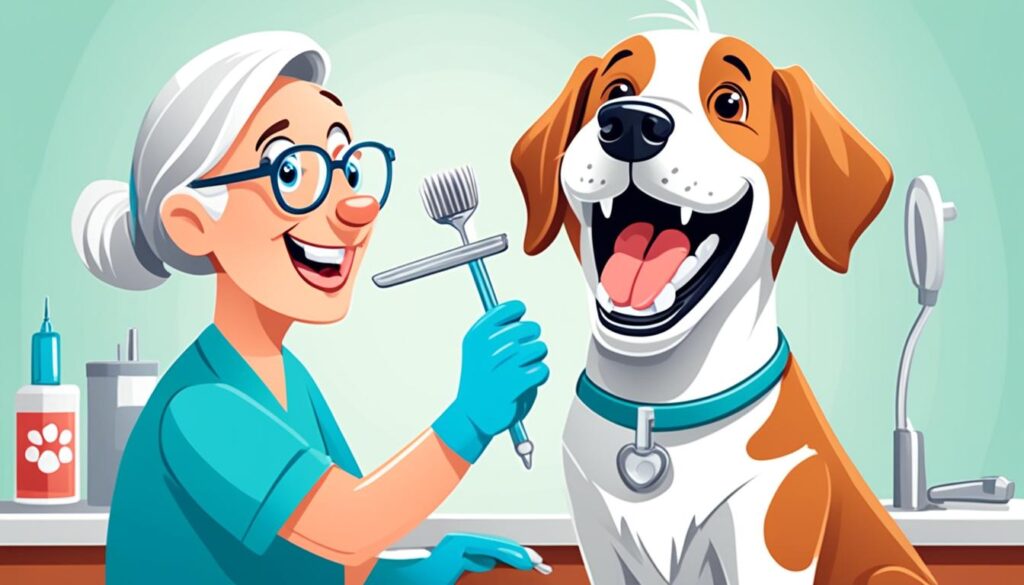Breed-Specific Health: Customized Care
Did you know that each dog and cat breed is predisposed to certain health issues? This means that their wellness needs to be approached in a unique and tailored way. Breed-specific care aims to optimize the health and well-being of our furry friends by customizing care strategies based on their specific breed characteristics.
From nutrition to exercise, dental care to grooming practices, understanding and addressing breed-specific health considerations can make a significant difference in ensuring the longevity and overall quality of life for our beloved pets.
Key Takeaways:
- Breed-specific care involves tailoring health strategies and care to the specific needs of different dog and cat breeds.
- Recognizing breed-specific health predispositions allows for proactive care and early detection of potential health concerns.
- Customizing nutrition to breed requirements helps address specific needs and promote optimal health.
- Tailoring exercise plans based on breed characteristics ensures both mental and physical well-being.
- Dental care should be adapted to address breed-specific dental needs and prevent issues like periodontal disease.
Recognizing Breed-Specific Health Predispositions
Different dog breeds have distinct genetic predispositions and vulnerabilities when it comes to health. It is crucial for pet owners to familiarize themselves with the potential health issues that commonly affect their dog’s breed. This knowledge allows for proactive care and the early detection and monitoring of potential health concerns. By recognizing and addressing breed-specific health predispositions, pet owners can ensure the well-being of their furry friends.
Some breeds may be more prone to certain genetic conditions, while others may have a higher risk of developing specific health issues. For example, large breeds like Great Danes are more susceptible to hip dysplasia, while brachycephalic breeds such as Bulldogs may experience respiratory difficulties due to their short noses. Being aware of these breed-specific health vulnerabilities can help pet owners take the necessary steps to prevent or manage potential health problems.
“Understanding your dog’s breed-specific health predispositions is key to proactive care and early intervention,” says Dr. Emily Wilson, a renowned veterinarian specializing in breed-specific wellness.
When pet owners are armed with knowledge about their dog’s genetic predispositions, it allows them to provide tailored care to address potential health concerns before they become major issues.
This proactive approach to care involves regular veterinary check-ups, breed-specific health screenings, and open communication with the veterinarian. By actively monitoring and managing potential health concerns, pet owners can help their dogs live long, healthy, and fulfilling lives.
Early Detection Through Health Screenings
Regular health screenings play a crucial role in identifying and addressing breed-specific health predispositions. These screenings may include genetic testing, blood work, X-rays, and other diagnostic procedures. By detecting potential problems at an early stage, veterinarians can intervene promptly and develop proactive care plans to mitigate risks and ensure the best possible outcomes for the pet.
Proactive Care Strategies for Breed-Specific Health Concerns
Once pet owners are aware of their dog’s breed-specific health predispositions, they can take several proactive measures to optimize their furry companion’s well-being. These strategies may include:
- Regular veterinary check-ups: Scheduled visits to the veterinarian allow for the early detection of any potential health issues and ensure ongoing monitoring of the dog’s overall health.
- Healthy diet and nutrition: Providing a balanced and appropriate diet tailored to the breed’s needs can support overall health and reduce the risk of certain health conditions.
- Preventive measures: Administering vaccinations, implementing flea and tick control, and heartworm prevention protocols are crucial preventive measures that help safeguard against potential health risks.
- Maintaining a healthy weight: Obesity can exacerbate breed-specific health concerns. Implementing weight management strategies can alleviate stress on the joints, organs, and overall well-being of the pet.
- Regular exercise: Tailoring exercise routines to suit the breed’s needs promotes physical fitness, mental stimulation, and overall well-being. Certain breeds may require more or less exercise, depending on their energy levels and specific health considerations.
“Proactive care is paramount when it comes to breed-specific health,” adds Dr. Wilson.
By understanding and addressing the unique genetic predispositions of each breed, pet owners can provide their dogs with the proactive care they need to live long and healthy lives.”
Customizing Nutrition to Breed Requirements
Different dog breeds may have varying nutritional needs, and it is important to customize their diet accordingly. By understanding and meeting these specific requirements, pet owners can ensure the optimal health and well-being of their furry friends.
Large breeds often have unique needs, especially when it comes to joint health and preventing rapid growth. Providing them with a diet formulated to support their joints and maintain a healthy weight can help prevent potential issues in the long run.
On the other hand, smaller breeds may require a tailored diet to prevent obesity. These breeds tend to have faster metabolisms and are more prone to weight gain. Offering them a suitable diet with portion control can help manage their weight and reduce the risk of obesity-related health problems.
Consulting with a veterinarian is crucial in determining the most suitable diet for your dog, taking into consideration factors such as breed, age, and activity level. A professional can provide guidance on the appropriate balance of nutrients and portion sizes to meet your pet’s unique nutritional needs.
Remember, a healthy and balanced diet plays a significant role in supporting overall health and preventing potential health issues. Ensuring that your dog’s nutrition is customized to their specific requirements is a proactive step towards their well-being and longevity.

| Breed Size | Specific Needs | Recommended Diet |
|---|---|---|
| Large Breeds | Joint health, prevent rapid growth | Formulated diets with controlled calorie intake, essential fatty acids, and glucosamine |
| Small Breeds | Prevent obesity | Portion-controlled diets with high-quality protein and balanced nutrient profile |
Tailored Exercise Plans
The exercise requirements of dogs can vary significantly based on their breed. High-energy breeds, such as Border Collies and Australian Shepherds, require more rigorous physical activities and mental stimulation to maintain their overall well-being. On the other hand, brachycephalic breeds like Bulldogs and Pugs may have respiratory challenges, necessitating more moderate exercise routines.
Tailoring the exercise plan to meet the specific needs of each breed is crucial for ensuring their mental and physical well-being. While high-energy breeds thrive on activities like running, agility training, and interactive games that challenge their intelligence, brachycephalic breeds may benefit from shorter walks and low-impact exercises to prevent breathing difficulties.
It’s important to note that exercise is not only about physical fitness but also contributes to a dog’s mental stimulation. A combination of physical and mental exercise helps prevent boredom and anxiety, promoting a happy and healthy life for your furry companion.
Benefits of Tailored Exercise:
- Improved cardiovascular health
- Weight management and prevention of obesity
- Enhanced muscle tone and strength
- Stress reduction and improved behavior
- Promotion of healthy digestion and elimination
Proper exercise routines catered to specific breeds contribute to the overall health, happiness, and longevity of our four-legged friends.
Exercise Tips by Breed:
| Breed | Exercise Requirements |
|---|---|
| Border Collie | High-energy, needs at least 1-2 hours of vigorous exercise daily |
| Bulldog | Moderate exercise, short and slow walks, avoid hot weather |
| Australian Shepherd | High-energy, requires daily physical and mental challenges |
| Pug | Moderate exercise, short walks, avoid excessive heat and humidity |
By understanding the exercise requirements of different breeds and tailoring activities accordingly, pet owners can ensure their dogs receive optimal physical and mental stimulation for a happy and fulfilling life.
Dental Care Tailored to Breed Characteristics
Dental health is a crucial component of a dog’s overall well-being. Just like humans, dogs can experience dental issues that may lead to discomfort, pain, and even more severe health problems if left untreated. However, it’s important to recognize that different breeds may exhibit varying susceptibility to dental issues. Understanding these breed-specific characteristics is essential for tailoring dental care and ensuring the long-term dental health of your beloved canine companion.
Breed-Specific Dental Issues
Some breeds, particularly those with compact mouths, may be more prone to dental problems. Their teeth may be crowded or misaligned, making it easier for plaque and tartar to accumulate. Breeds with shorter snouts, such as Bulldogs or Pugs, may also face unique dental challenges due to their brachycephalic nature. On the other hand, larger breeds that have longer jaws may be at a higher risk of developing periodontal disease. Being aware of these breed-specific dental issues enables pet owners to take proactive measures to combat them.
To illustrate the varying dental needs among different breeds, consider the contrasting dental health profiles of two popular breeds: the Dachshund and the Golden Retriever. Dachshunds, with their compact mouths and tooth crowding, are more susceptible to dental issues like gum disease and tooth decay. In contrast, Golden Retrievers, known for their larger size and longer jaws, may be at greater risk of developing periodontal disease. Recognizing these distinctive characteristics allows pet owners to tailor their dental care efforts accordingly.
Customizing Dental Care
To ensure optimal dental health for your dog, a customized approach is necessary. Here are some essential strategies:
- Regular dental check-ups: Schedule regular dental examinations with your veterinarian to monitor your dog’s dental health and address any emerging issues.
- Toothbrushing: Establish a toothbrushing routine using dog-friendly toothpaste and a soft-bristled toothbrush. Your veterinarian can guide you on the appropriate technique and frequency for your dog’s breed.
- Appropriate chew toys: Provide your dog with chew toys that are specifically designed to promote dental health. These toys can help remove plaque and tartar buildup while satisfying their natural chewing instincts.
By implementing these tailored dental care practices, pet owners can help prevent dental problems, maintain fresh breath, and ultimately contribute to their dog’s overall well-being.

Grooming Practices Based on Coat Type
Grooming requirements for dogs vary depending on their breed and coat type. Long and dense fur requires more frequent brushing to prevent matting and reduce shedding. For breeds with shorter coats, grooming needs are typically less intensive.
Regular grooming is essential for maintaining a healthy coat and skin, regardless of the length of the fur. It helps to remove dirt, distribute natural oils, and prevent tangling or matting, which can lead to discomfort or skin issues.
Grooming Requirements for Long and Dense Fur
Breeds with long and dense fur, such as the Golden Retriever or the Siberian Husky, require regular grooming to keep their coats in optimal condition. Here are some grooming practices for long and dense fur:
- Regular brushing: Brushing at least once or twice a week helps to remove loose hair, prevent tangles, and maintain a healthy coat.
- De-shedding tools: Using de-shedding tools can reduce shedding and minimize the amount of loose hair in the home.
- Bathing: Occasional baths using a gentle dog shampoo can keep the fur clean and free from dirt and odors.
- Trimming: Some long-haired breeds may benefit from occasional trimming to keep their fur neat and prevent it from becoming too tangled.
Grooming Requirements for Shorter Coats
Breeds with shorter coats, like the Dalmatian or the Boxer, typically require less maintenance in terms of grooming. However, regular brushing is still important to keep their coats clean and healthy. Here are some grooming practices for breeds with shorter coats:
- Regular brushing: Brushing once or twice a week helps to remove loose hair, dirt, and debris from the coat.
- Bathing: Occasional baths using a gentle dog shampoo can help keep the coat clean and free from dirt and odors.
- Nail trimming: Regular nail trimming is essential for all breeds to prevent overgrowth and discomfort.
- Ear cleaning: Regularly check and clean the ears to prevent infections and ensure good ear health.
Regardless of the breed and coat type, it’s important to establish a grooming routine early on to keep your dog’s coat and skin in optimal condition. Regular grooming, along with a nutritious diet and proper hygiene, contributes to a healthy and happy canine companion.
Preventive Measures for Genetic Conditions
Certain genetic conditions are more prevalent in specific dog breeds. It is essential for pet owners to be proactive in identifying and managing these conditions to ensure the health and well-being of their furry companions. Early detection through regular veterinary check-ups, combined with breed-specific health screenings, plays a crucial role in preventing the progression of genetic conditions.
Genetic conditions can manifest in various ways, ranging from mild to severe, and can affect different organs or systems of the body. By detecting these conditions early on, pet owners can implement appropriate preventive measures and interventions to manage or minimize potential health risks.
Health Screenings: Early Detection
Veterinary health screenings are an invaluable tool for identifying potential genetic conditions before they become more severe or life-threatening. These screenings involve a thorough examination of a dog’s health history, physical assessment, and diagnostic tests specific to the breed.
During these screenings, veterinarians may recommend genetic testing to identify any underlying genetic mutations that could lead to the development of certain conditions. This early detection allows for prompt intervention and the implementation of preventive measures tailored to the dog’s specific needs.
Some common genetic conditions that may be detected through health screenings include:
- Hip dysplasia
- Progressive retinal atrophy
- Cardiac conditions
- Autoimmune diseases
To illustrate the significance of health screenings, let’s consider an example of a breed known for its susceptibility to hip dysplasia. Through regular screenings, veterinarians can identify any signs of hip dysplasia at an early stage, allowing pet owners to explore various preventive measures such as physical therapy, joint supplements, or even surgical interventions to improve the dog’s quality of life.
Preventive Measures: Promoting Long-Term Health
While early detection is crucial, proactive preventive measures are equally important in managing genetic conditions. Pet owners can take several steps to promote the long-term health and well-being of their dogs, including:
- Vaccinations: Ensuring dogs receive the recommended vaccinations can help prevent infectious diseases and protect their overall health.
- Flea and tick control: Regular use of flea and tick prevention products can help safeguard against the transmission of diseases and parasites.
- Heartworm prevention: Administering heartworm preventive medications as recommended by veterinarians can prevent the potentially fatal infection caused by heartworm parasites.
- Healthy diet: Providing a balanced and nutritious diet, specifically tailored to the dog’s breed and any specific health concerns, can support overall well-being and minimize the risk of developing certain conditions.
- Regular exercise: Engaging dogs in regular physical activity not only helps maintain a healthy weight but also promotes cardiovascular health and mental stimulation.
By implementing these preventive measures and combining them with regular veterinary check-ups, pet owners can significantly reduce the risk and impact of genetic conditions on their beloved canine companions, ensuring a healthier and happier life for their furry friends.
| Genetic Condition | Preventive Measures |
|---|---|
| Hip dysplasia | – Maintain a healthy weight to reduce stress on the hips – Provide joint supplements to support hip health – Regular exercise to strengthen muscles |
| Progressive retinal atrophy | – Regular eye examinations – Breed-specific genetic testing – Provide a well-balanced diet rich in antioxidants |
| Cardiac conditions | – Regular heart screenings – Manage diet to control sodium intake – Follow recommended exercise guidelines |
| Autoimmune diseases | – Support immune system health through proper nutrition and regular exercise – Minimize exposure to potential triggers – Regular vet check-ups for early detection and management |

Conclusion
Tailoring your dog’s health care to its specific breed is a proactive and informed approach that ensures a happy and healthy life for your beloved pet. By recognizing the breed-specific predispositions and customizing nutrition, exercise, dental care, grooming practices, and preventive measures, you can provide the best possible care for your furry friend.
Regular veterinary check-ups and a thorough understanding of your dog’s breed-specific needs are crucial components of this proactive approach. These practices contribute to the overall well-being and longevity of the canine community, ensuring that your dog enjoys a high quality of life.
Remember, investing time and effort in understanding your dog’s breed and its unique requirements pays off in the long run. By taking a proactive and informed approach to your dog’s health, you can promote a happy and healthy life for your furry companion, maximizing their quality of life for years to come.
FAQ
What is breed-specific care?
Breed-specific care aims to tailor health strategies and care to the specific needs of different dog and cat breeds. By understanding the genetic predispositions and vulnerabilities of each breed, pet owners can provide proactive and personalized care to ensure the overall well-being and longevity of their pets.
Why is it important to recognize breed-specific health predispositions?
Different dog breeds have distinct genetic predispositions and vulnerabilities when it comes to health. By familiarizing themselves with the potential health issues that commonly affect their dog’s breed, pet owners can provide proactive care, detect and monitor potential health concerns early, and ensure the well-being of their furry friends.
How should I customize the nutrition for my dog’s breed?
Different dog breeds may have varying nutritional needs. Consulting with a veterinarian can help determine the most suitable diet based on the breed, age, and activity level of the dog. For example, large breeds may benefit from diets that support joint health and prevent rapid growth, while smaller breeds may require diets tailored to prevent obesity.
How should I tailor the exercise routine for my dog’s breed?
The exercise requirements of dogs can vary significantly based on their breed. High-energy breeds may thrive on more rigorous and mentally stimulating activities, while brachycephalic breeds may require more moderate exercise due to respiratory challenges. By tailoring the exercise routine to the specific breed needs, pet owners can ensure the overall well-being and mental stimulation of their dogs.
How should I address the dental needs of my dog’s breed?
Dental health is an essential aspect of overall well-being for dogs, and different breeds may exhibit varying susceptibility to dental issues. Regular dental check-ups, tooth brushing, and providing appropriate chew toys can be tailored to address the specific dental needs of each breed. Breeds with compact mouths may be more prone to dental problems, while larger breeds may be at risk for periodontal disease.
How should I groom my dog based on its coat type?
Grooming requirements vary widely among different dog breeds, particularly in terms of coat type. Breeds with long and dense fur may require more frequent brushing to prevent matting and reduce shedding. On the other hand, breeds with shorter coats may need less intensive grooming. Understanding breed-specific grooming needs helps maintain a healthy coat and skin for each dog.
How can I prevent genetic conditions in my dog’s breed?
Certain genetic conditions are more prevalent in specific dog breeds. Regular veterinary check-ups, including breed-specific health screenings, can aid in the early detection of potential genetic conditions. Proactive preventive measures such as vaccinations, flea and tick control, and heartworm prevention are crucial components of tailored health care for all breeds.
Why is tailoring health care to a dog’s breed important?
Tailoring health care to a dog’s breed is a proactive and informed approach to ensuring a happy and healthy life for the pet. By recognizing breed-specific predispositions and customizing nutrition, exercise, dental care, grooming practices, and preventive measures, pet owners can provide the best possible care for their furry friends. Regular veterinary check-ups and a thorough understanding of the breed-specific needs contribute to the overall well-being and longevity of the canine community.

